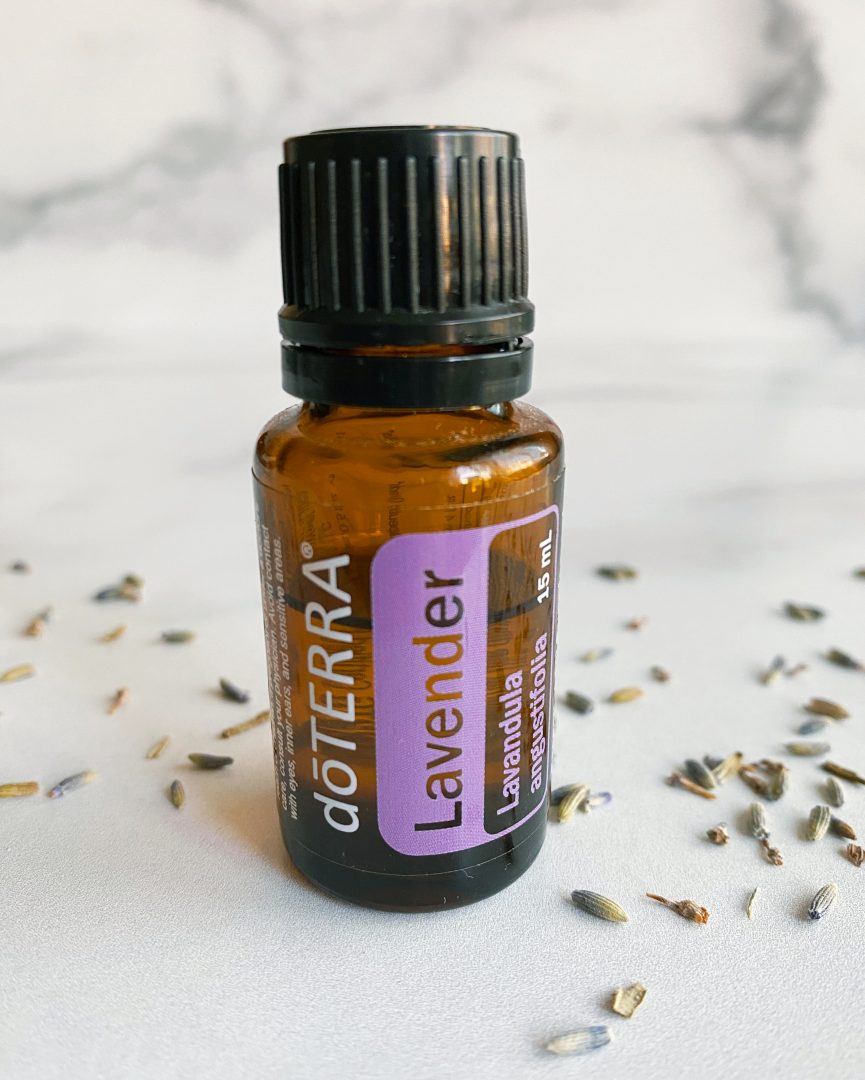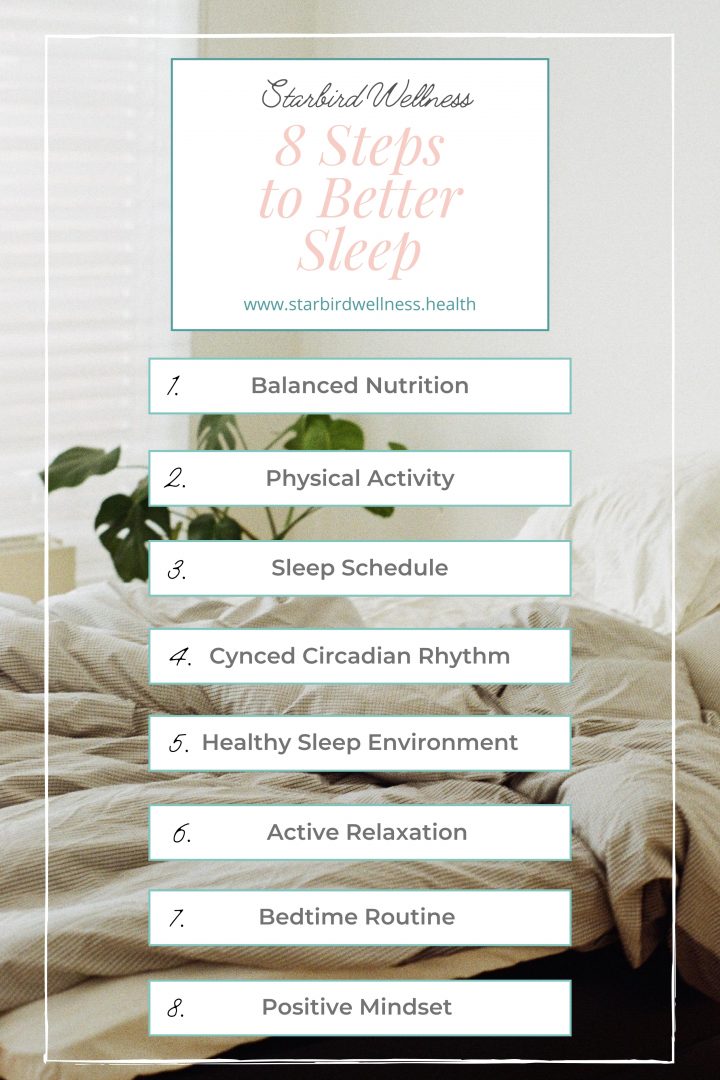Improve Sleep without Medications:
For some of you these tips may be old news, but if you’re anything like me sleep is one of the areas where you can use frequent reminders. Sleep is one of the most important parts of a solid wellness routine, yet it’s often something that we don’t prioritize. Unfortunately, without proper sleep it’s difficult to attain optimal wellness. Sleep is critical for repairing, resetting, and regenerating the body. Lack of quality sleep might be the issue if you’ve hit a plateau in reaching your wellness goals. Keep reading for tips on how to improve your sleep naturally using nutrition and lifestyle practices.
Sleep Hygiene 101: 8 Steps to Improve Sleep Naturally
1. Eat to Improve Sleep
- Eat a nutrient dense, anti-inflammatory diet
- Limit or Avoid Caffeine and other stimulants
- Limit or Avoid Refined Sugar and excess carbohydrates
- Limit or Avoid Alcohol, as it disrupts sleep quality
- Don’t eat large meals close to bedtime
- Don’t go to bed hungry, eat a small protein snack if you need to
- Hydrate regularly throughout the day, but try to reduce your liquid intake as it gets closer to bedtime
- Eat foods rich in Vitamin D, Magnesium, and tryptophan, as well as melatonin stimulating foods

2. Move to Improve Sleep
- Choose the type of physical activity that works for your body. For some people this might mean a brisk walk. For others it might mean functional strength training, or high intensity interval training. If stress is an issue for you, then high intensity cardio may not be a good fit. Try Barre, Pilates, yoga, or hiking instead.
- Don’t exercise right before bed. Gentle stretching or restorative yoga are perfect for winding down, but cardio, not so much. Try to get your exercise in earlier in the day.
- Try to get a little bit of physical activity every day if you can. Even 5-10 minutes is better than nothing.
3. Set a Sleep Schedule and Stick to It
- Having a solid bedtime routine should not be underestimated when it comes to getting quality sleep. Pick a bedtime that will work for you and then try your best to stick to it.
- Just like your bedtime, you should try and wake up at the same time every day as well.
- Choose your wake and bedtimes based on what works for your lifestyle and make sure you are allowing for at least 7 hours of solid sleep.
- Try not to take naps unless you are under the weather or aren’t feeling well. Napping can disrupt your sleep cycle and make falling asleep difficult at bedtime.
4. Support your Circadian Rhythm & Use Electronics Wisely
- Try to get outside in the sun every day, if possible. Short bouts of sunbathing will improve your vitamin D levels and support your circadian rhythm, which is important for physiological function and quality sleep. Just don’t stay out too long unless you plan on wearing a non-toxic sunblock.
- Try to “unplug” 1.5-3 hours before bed. Some people need more down time, and some people less. Experiment to see what works best for you.
- Use blue light blocking glasses to protect your eyes from screen time. The blue light from our screens can disrupt our circadian rhythm and impair sleep. Using blue light blocking glasses may help mitigate this effect.
- Try to keep your electronics out of the bedroom, especially the television. This can be a really difficult one for people, but the electromagnetic radiation from all those electronics can disrupt the quality of your sleep, not to mention the light from the screens.
Circadian rhythms are the cycles that tell the body when to sleep, wake, and eat—the biological and psychological processes that oscillate in predictable patterns each day. This internal clock is influenced by external cues, like sunlight and temperature, which help determine whether one feels energized or exhausted at different times of the day.
Psychology Today

Not all colors of light have the same effect. Blue wavelengths—which are beneficial during daylight hours because they boost attention, reaction times, and mood—seem to be the most disruptive at night. And the proliferation of electronics with screens, as well as energy-efficient lighting, is increasing our exposure to blue wavelengths, especially after sundown.
Harvard Medical School
5. Create a Healthy Sleep Environment: Make your bedroom a sanctuary
- Make sure your bedroom is dark and quiet for sleep time. Use an eye-mask and earplugs if you need to. Light blocking curtains are also helpful.
- Make sure that your bed is comfortable and free from toxic chemicals.
- Choose soothing colors, such as blue, for your decor to help promote sleep.
- Keep your bedroom at a comfortable temperature, slightly cooler than during the day, and choose bedding that is breathable and made with natural fabrics.
- Beautify your bedroom with objects that bring you joy, but don’t clutter your space.
- Try to reserve your bedroom for sleeping and intimacy, this way your body will know it’s time to rest once you get into bed.
6. Reduce Stress with Active Relaxation
Active relaxation is key to managing stress and calming the nervous system. If anxiety and a busy, or racing mind are keeping you up at night, then these active relaxation practices may be just what you need. Experiment to find the combination of practices that works best for you.
- Guided meditation
- Epsom salt bath
- Aromatherapy
- Body Scan Meditation
- Deep breathing exercises
- Gentle stretching
- Nature walks/time in nature
- Prayer
- Restorative yoga
- Mindfulness Based Stress Reduction
- Dry Brushing
- Tai Chi
- Listening to soothing music
- Keeping a daily Gratitude Journal
- Positive Affirmations
- Time with loved ones

7. Create a Soothing Bedtime Routine
- Having a bedtime routine helps train your body for sleep. Try to wind-down with a quick self-care practice before bed. If you need some ideas, choose your favorites from the list of “Active Relaxation” techniques above. Eventually your bedtime routine will signal your body that it’s time for sleep.
- Aromatherapy is a versatile, quick, and easy self-care practice that works perfectly before bed. You can easily incorporate it into other self-care and bedtime routines. Choose a relaxing essential oil, such as lavender, chamomile, or bergamot. You can add essential oils to your body oils and lotions, epsom salt baths, diffuse them on your nightstand, or spray them on your pillow (mix your favorite oil/oil blend with filtered water). Oils can be incorporated into your meditation and yoga practices as well.
- Have a soothing cup of tea to prep your body for sleep. Some of my favorite bedtime teas are Tulsi, Rose, and Lavender + Chamomile.
8. Cultivate a Positive Mindset to Improve Sleep
- Put yourself in a positive mindset before your head hits the pillow. We all know what it feels like to try to fall asleep with racing thoughts. Before bed, try to calm your mind and shift it away from thoughts that bring you fear, worry, anger, frustration, or despair. This is especially important if anxiety or rumination are impairing your sleep.
- Challenge thoughts that don’t serve you. Your thoughts aren’t facts and you don’t have to believe everything you think. Learn to challenge your unhelpful thoughts and replace them with ones that better serve your longterm wellness goals. CBT and DBT, as well as Mindfulness Based Stress Reduction are three therapeutic modalities that are helpful in this area.
- Don’t underestimate the power of making a daily entry in a gratitude journal. Cultivating a positive mindset is a daily practice, and what better way to go to sleep than with a grateful heart?

Need more support on your wellness journey? Let’s chat!



Thank you! Beautifully written and well thought out.
Thank you so much for reading and commenting! I hope you’re having a wonderful day.